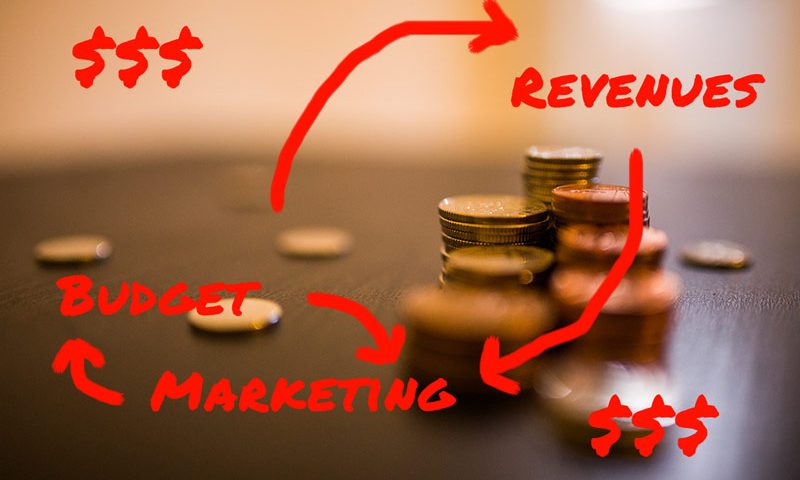Don’t Wait for Revenue Start Doing Marketing Now

Typically, marketing is not the main thing on a startup founder’s mind when launching a new company. Yes marketing will take up a portion of headspace for creating things like a new logo, website layouts, website copy, pricing plans, etc. But rarely do small startups actually factor in the on-going cost of doing marketing into their business plan and product pricing. This is a huge problem when it comes time to moving the business forward. You may hear things like “we’ll do marketing after revenues grow” or the ever popular “we only do marketing activities that are profitable” and my personal favorite “our product is so good that we don’t need to do any marketing, people will come to us.” All 3 of those statements can be quite treacherous. If a startup’s growth stagnates, problems begins to compound as the business hires more people and incurs more and more fixed expenses.
If you launch a business and there is nobody around to see it, is it still a business? The answer is no, it is a hobby.
Free Growth is a Myth
If you launch a business and there is nobody around to see it, is it still a business? The answer is no, it is a hobby. There is no doubt the product, service, or business function is the most important part of an organization; it’s the real reason your are doing it anyway. However, consider what all the hard work is worth if nobody is around to buy it. A new business can certainly make revenue early on. Many times it comes from the circle of people in the founder’s social or professional networks and those of employees. But how do you get to the point where you are reaching new unconnected, unaware buyers. It certainly can’t be done without some form of promotional marketing.
- Waiting until revenues appear is a self-defeating prophecy.
- Without promotion, you won’t sell.
- Without sales there won’t be any revenue.
- And without revenue you will never do any promotion.
- Growth ends before it begins.
Quality Can’t Win Alone
It can be difficult for business founders to acknowledge the fact that no matter how good their product or service is, they need to take an active role in facilitating promotion. Relying on the merits of their offer alone is simply not enough to move the needle. Before the 1920s, goods tended to sell themselves, but in today’s highly competitive and noisy marketplace, the struggle is just being heard at all. How can someone make a sales pitch if they can’t find anyone to pitch to? If you are expecting growth to occur naturally and for free, you are going to be waiting a long time.
- It is important to raise awareness of your product or service even if your offer is unique, high quality and wonderful.
- You are not only competing with similar competitors, but you are competing for a limited number of eye and ears among everyone else too.
SEO Isn’t Free
Search engine optimization (SEO) is a great idea especially for new online startups. However, many times the fact that doing quality SEO whether structurally (on-site) or functionally (off-site) actually costs time and money is overlooked or brushed aside. It is easy to view this marketing channel as free because it doesn’t cost you for each additional time your page is displayed or clicked on from search engine results. However, SEO is built from code which requires a special skill-set, time and probably money if you aren’t doing it yourself. There is an inherent cost to doing SEO which depending on your website’s size, framework and complexity can be costly.
- Startups with limited budgets should focus on building quality on-site SEO at the same time their website is being constructed.
- Titles, Header Tags, Meta Descriptions, Marketing copy, keyworded URLs and page structure hierarchies go a long way.
- Create a list of easy and obvious SEO initiatives. Set aside time and or money from your overall marketing budget each month to continually work your list.
- SEO is long term. Yes it is important to be thinking about, but don’t put all your resources into this channel early on especially on a limited budget. Look for quicker wins to get growth moving now.
Always Be Promoting
It is very important to allocate a portion of your startup’s investment to regular monthly marketing activities even if the amount starts out small. Give your startup a chance to get noticed and grow. Sometimes a few well placed dollars or well spent hours can make a big difference. Getting in front of the right people, with the right message, at the right time should be your ultimate goal. Whether you are doing the marketing yourself or delegating, don’t be afraid to get your hands dirty and try a variety of promotional tactics.
- When planning your business, always include a portion of investment in time and money for marketing each month, even if it is small. Otherwise all your other business efforts will be in vain.
- Do some research and see what appears to be working well for your closest competitors.
- Are they active on social media? There must be a good reason why.
- Do they send out regular email newsletters? They probably get a steady stream of business from that too.
- Test out a few different low cost marketing strategies from buying advertising, to picking up the phone and setting appointments for sales calls.
- Do SEO optimization if you can, but make it a smaller part of the bigger marketing picture.
- Be prepared, always carry a few business cards and look for opportunities to promote in your day to day activities. Make sure you have a working email or business phone line.
- Don’t spread your marketing budget in money and time time to thinly. Better to do a few things really well than a lot of things mediocrely.
Final Thoughts
Small businesses or startups on limited budgets may not have the ability to do much paid marketing. It will be up to the founder to decide whether to spend funds or to use their own time to do active promotion. It is certainly helpful to have some money set aside when starting a business that can be put towards marketing, however that always isn’t the case. Consider looking for business investment, potential silent partners or factoring in the cost of marketing to your product pricing (which you should be doing anyway). It is important to do this because marketing is not only part of the cost of doing business, but how you do business in the first place.


